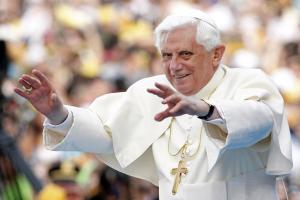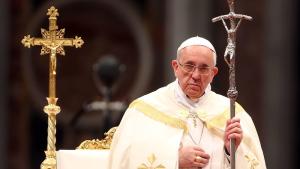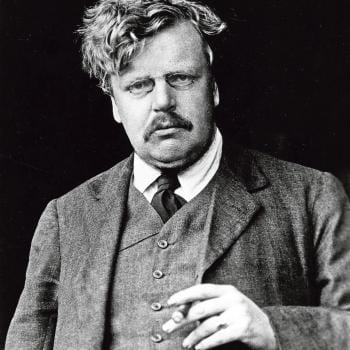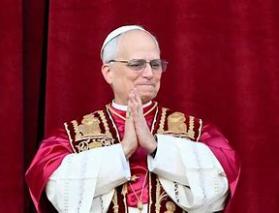Here we are in Lent!
Listen to us for a moment.-Paul VI
Listen to the voices of the vicars of Christ as they give us thoughts to meditate and chew upon with our hearts and souls during this great holy season of Lent.
We ask you to go out to meet poor Lazarus,
in his hunger and misery.
Papal Thoughts About Lent
Make yourself his neighbour, so that he can recognize in your eyes the eyes of Christ welcoming him, and in your hands the hands of the Lord sharing his gifts. And respond generously to the appeals that will be made to you in your own local Churches, so that you can relieve those who are most disinherited, and share in the progress of the peoples who are most deprived.
We remind you of the words of the Lord Jesus on helping the weak, words happily preserved for us by the Apostle Paul: “it is more blessed to give than to receive” (Acts 20:35). We exhort you all, dear sons and daughters, to purify your hearts in order to welcome the coming Easter celebrations and to proclaim to the world the joyous Good News of salvation. And we bless you in the name of the Father and of the Son and of the Holy Spirit. Amen.
Message for Lent 1977 | Paul VI

PAUL VI
Jesus had a particular love for children
because of “their simplicity, their joy of life,
their spontaneity, and their faith filled with wonder”
(Angelus Message, 18 December 1994).
For this reason he wishes the community to open its arms and its heart to them, even as he did: “Whoever receives one such child in my name receives me” (Mt 18:5). Alongside children Jesus sets the “very least of the brethren:” the suffering, the needy, the hungry and thirsty, strangers, the naked, the sick, and the imprisoned. In welcoming them and loving them, or in treating them with indifference and contempt, we show our attitude towards him, for it is in them that he is particularly present.
The Gospel recounts the childhood of Jesus in the simple home of Nazareth, where he was obedient to his parents and “increased in wisdom and in years, and in favour with God and man” (Lk 2:52). By becoming himself a child, he wished to share our human experience. “He emptied himself,” writes the Apostle Paul, “taking the form of a slave, being born in the likeness of men. And being found in human form he humbled himself and became obedient unto death, even death on a Cross” (Phil 2:7-8). When at twelve years old he remained in the Temple in Jerusalem, he said to his parents who anxiously looked for him: “How is it that you sought me? Did you not know that I must be in my Father’s house?” (Lk 2:49). Indeed, his whole life was marked by a trusting and filial obedience to his heavenly Father. “My food,” he said, “is to do the will of him who sent me, and to accomplish his work” (Jn 4:34).
In the years of his public life Jesus often insisted that only those who become like children will enter the Kingdom of Heaven (cf. Mt 18:3; Mk 10:15; Lk 18:17; Jn 3:3). In his teaching, young children become a striking image of the disciple who is called to follow the divine Master with childlike docility: “Whoever humbles himself like this child, he is the greatest in the Kingdom of Heaven” (Mt 18:4).
“To become” one of the least and “to receive” the little ones: these are two aspects of a single teaching which the Lord repeats to his disciples in our time. Only the one who makes himself one of the “least” is able to receive with love the “least” of our brothers and sisters.
Lent 2004 | John Paul II

Lent is a privileged time of interior pilgrimage
towards Him Who is the fount of mercy.
It is a pilgrimage in which He Himself accompanies us through the desert of our poverty, sustaining us on our way towards the intense joy of Easter. Even in the “valley of darkness” of which the Psalmist speaks (Ps 23:4), while the tempter prompts us to despair or to place a vain hope in the work of our own hands, God is there to guard us and sustain us. Yes, even today the Lord hears the cry of the multitudes longing for joy, peace, and love. As in every age, they feel abandoned. Yet, even in the desolation of misery, loneliness, violence and hunger that indiscriminately afflict children, adults, and the elderly, God does not allow darkness to prevail. In fact, in the words of my beloved Predecessor, Pope John Paul II, there is a “divine limit imposed upon evil”, namely, mercy (Memory and Identity, pp. 19ff.). It is with these thoughts in mind that I have chosen as my theme for this Message the Gospel text: “Jesus, at the sight of the crowds, was moved with pity” (Mt 9:36).
Message of His Holiness Benedict XVI for Lent 2006 | BENEDICT XVI

In this Lenten season,
accepting and living the truth revealed in Christ means,
first of all,
opening our hearts to God’s word,
which the Church passes on from generation to generation.
This truth is not an abstract concept reserved for a chosen intelligent few. Instead, it is a message that all of us can receive and understand thanks to the wisdom of a heart open to the grandeur of God, who loves us even before we are aware of it. Christ himself is this truth. By taking on our humanity, even to its very limits, he has made himself the way – demanding, yet open to all – that leads to the fullness of life.
Fasting, experienced as a form of self-denial, helps those who undertake it in simplicity of heart to rediscover God’s gift and to recognize that, created in his image and likeness, we find our fulfilment in him. In embracing the experience of poverty, those who fast make themselves poor with the poor and accumulate the treasure of a love both received and shared. In this way, fasting helps us to love God and our neighbour, inasmuch as love, as Saint Thomas Aquinas teaches, is a movement outwards that focuses our attention on others and considers them as one with ourselves (cf. Fratelli Tutti, 93).
Lent is a time for believing, for welcoming God into our lives and allowing him to “make his dwelling” among us (cf. Jn 14:23). Fasting involves being freed from all that weighs us down – like consumerism or an excess of information, whether true or false – in order to open the doors of our hearts to the One who comes to us, poor in all things, yet “full of grace and truth” (Jn 1:14): the Son of God our Saviour.














